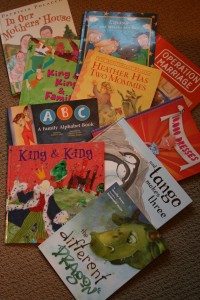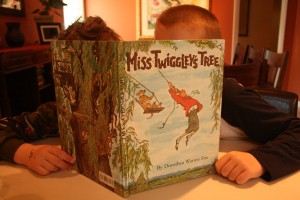
 My kids' bookcase is full of banned books: Heather Has Two Mommies, And Tango Makes Three, The Different Dragon, and King and King, to name a few. However, when the principal of my oldest son's elementary school asked me to be a guest reader on "Read Across America Day," I didn't even think about reading one of those. No, when I selected the text for this particular event, I chose a favorite from my own childhood, Miss Twiggley's Tree, written in 1966, by Dorothea Warren Fox. Why? Not because I'm afraid to rustle up some controversy in the service of LGBT visibility, but because the kids in my son's class already know about two-mom families. After all, I'm here, I'm queer, and I volunteer in this classroom every week. Actually, I chose my dear friend Miss Twiggley because I had a larger (dare I use the word?) agenda in mind.
My kids' bookcase is full of banned books: Heather Has Two Mommies, And Tango Makes Three, The Different Dragon, and King and King, to name a few. However, when the principal of my oldest son's elementary school asked me to be a guest reader on "Read Across America Day," I didn't even think about reading one of those. No, when I selected the text for this particular event, I chose a favorite from my own childhood, Miss Twiggley's Tree, written in 1966, by Dorothea Warren Fox. Why? Not because I'm afraid to rustle up some controversy in the service of LGBT visibility, but because the kids in my son's class already know about two-mom families. After all, I'm here, I'm queer, and I volunteer in this classroom every week. Actually, I chose my dear friend Miss Twiggley because I had a larger (dare I use the word?) agenda in mind.
 As a child, I fell in love with Miss Twiggley because of the book's imaginative illustrations, the infective, sing-song rhythm and rhyme, and the shared experience of my mom reading it to me before nap time. After a long hibernation in a storage box, Miss Twiggley reentered my life in my early 20s, when I listened to my sister, a first-grade teacher, reading the book to her students. That time, with a few graduate courses in LGBT studies under my belt, I saw Miss T in an entirely new way.
As a child, I fell in love with Miss Twiggley because of the book's imaginative illustrations, the infective, sing-song rhythm and rhyme, and the shared experience of my mom reading it to me before nap time. After a long hibernation in a storage box, Miss Twiggley reentered my life in my early 20s, when I listened to my sister, a first-grade teacher, reading the book to her students. That time, with a few graduate courses in LGBT studies under my belt, I saw Miss T in an entirely new way.
Check it out:
Funny Miss Twiggley
Lived in a tree
With a dog named Puss [Ed. note: Seriously?]
And a color TV.
It gets better:
She named her dog Puss --
He didn't mind that.
"My very best friend,"
He said, "is a cat." [Ed. note: Uh huh.]
And the kicker:
Old Miss Twiggley
Was friendly with bears. [Ed. note: Yes, it really says "bears."]
"They shed on the sofa," she said,
"but who cares!
They don't find me odd
And I'm grateful for that.
I don't think they'd mind
If I slept in my hat."
And just to be sure...
she slept in her hat. [Ed. note: Go Twiggley.]
OK, So Miss T's lifestyle is a little unusual. And the people in her town are totally freaked out by that. Whenever poor Puss leaves the tree to fetch groceries, the town dogs bully him, chasing him home. As for Miss T, well, she hides out in the tree all day, suffering from a debilitating case of shyness. And why wouldn't she? She's got "the mayor's wife" talking smack about her to anyone who will listen, calling sweet Miss T "disgraceful" and "a nuisance," insisting:
"My husband must know
Of a town law," said she.
"Against things of that kind
Going on in a tree."
Really? "Town law"? "Things of that kind"? Come on. How queer can this story get?
But all "reading through a rainbow lens" aside, the true power of this book is that it doesn't assign a specific identity category to Miss Twiggley. She's not the town outsider because of her race, gender, sexual orientation, abilities, or religion. She's just quirky. Which means anyone can relate to her, because we're all quirky in our own ways. Ultimately, Miss Twiggley is not an "other." She's not a "them." She's an "all of us."
As such, Miss Twiggley brings us beyond the limitations of identity politics, which so often break down into an "us against them" dynamic characterized by discourse that sounds a lot like cranky 6-year-olds (or 66-year-olds, as the case may be) bickering in that did-not/did-too/did-not/did-too way, which devolves into the fingers-in-ears-la-la-la-I'm-not-listening-to-you thing, which ultimately gets us nowhere we want to be.
Anyway, back Miss T's story. Guess what happens? Well, the whole town floods (in a not-scary-to-kids way), washing out every home except -- yes, you guessed it -- the one in the tree. And what does our oddball heroine do? She overcomes her shyness and puts Puss and her crew of bears to work, expanding the tree house so all the townsfolk can live with her (until, presumably, FEMA helps rebuild their homes in, like, 15 years). Why does the righteous Miss T make this leap? Because she knows that when the flood (or earthquake or tornado or terrorist attack) comes, we're all in it together, no matter what our ideologies, prejudices, or fears.
And yes, by the way, the Twigster's new tenants include one deeply apologetic mayor's wife, who sleeps "safe and sound" in Miss Twiggley's bed, wearing Miss Twiggley's hat [Ed. note: Mmm hmm].
So here's where my "larger agenda" comes in. I realize I could have chosen to read a book about a kid who has two moms, and maybe that would have helped my own little guy feel better represented in his class. But I chose a book about difference in general, because I'd like to think a discussion about Miss T could help not just my guy, but, say, the bird-bone skinny kid in the back row who wants to share his encyclopedic knowledge of ocean predators all day; or the 6-year-old stomach cancer survivor whose short crop of feather-fuzzy hair is a testament to her chemo days; or the few children whose families honor cultural traditions the other students are encountering for the first time; or the kids who don't know what to do when someone else's differences make them feel uncomfortable.
Which begs the question: what can we do when we feel uncomfortable in the face of our differences? Well, according to Miss Twiggley and the ragtag crew of first graders I was hanging with the other day, instead of being scared and mean and rejecting, we can be curious and brave and welcoming.
Sounds like a good start to me.
